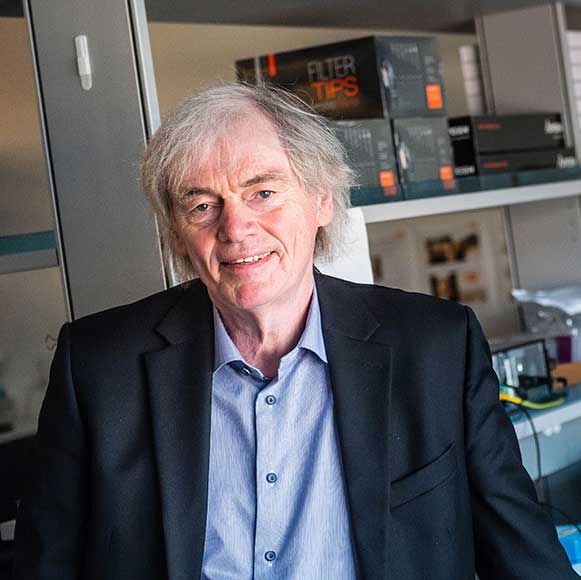Dr. Pieter Cullis, a professor in the UBC faculty of medicine’s department of biochemistry and molecular biology, has been elected as a Fellow of the Royal Society (FRS), the UK’s national academy of sciences and the oldest science academy in continuous existence.

The appointment recognizes Dr. Cullis’ groundbreaking work developing the lipid nanoparticle delivery technology that enables advanced nanomedicines, such as the highly effective COVID-19 mRNA vaccines.
Dr. Cullis is among 80 outstanding researchers, innovators and communicators from around the world elected to the Society for 2023. In receiving this honour, Dr. Cullis join the ranks of Stephen Hawking, Isaac Newton, Charles Darwin, Albert Einstein, Lise Meitner, Subrahmanyan Chandrasekhar and Dorothy Hodgkin.
Dr. Cullis and his UBC collaborators, including Dr. Thomas Madden, Dr. Michael Hope and others, have been responsible for fundamental advances in the development of nanomedicines employing lipid nanoparticle (LNP) technology for cancer therapies, gene therapies and vaccines. This work has contributed to five drugs approved by various regulatory bodies. These include Onpattro (the first RNAi drug to receive regulatory approval) to treat the previously fatal hereditary condition transthyretin-induced amyloidosis (hATTR), as well as Comirnaty, the Pfizer/BioNTech COVID-19 mRNA vaccine.
Dr. Cullis has also co-founded eleven biotechnology companies that now employ over 400 people, has published over 350 scientific articles and is an inventor on over 100 patents. He co-founded two Canadian National Centre of Excellence networks, the Centre for Drug Research and Development (now AdMare) in 2004 and the NanoMedicines Innovation Network in 2019.
“Election to the Royal Society is an unbelievable honour,” Dr. Cullis said. “On Friday July 14, I signed the same book as Isaac Newton and Charles Darwin. I don’t think there is much that can top that. I have to thank all my collaborators over the years, particularly Mick Hope, Tom Madden, Marcel Bally and Lawrence Mayer with whom I have worked for nearly 50 years. The FRS award reflects the work that they and many others have done, and I accept it on their behalf.”
Dr. Cullis’ scientific discoveries and entrepreneurial spirit have helped positioned Canada as a global leader in next-generation vaccines and therapeutics. He has trained thousands of future scientists and his work is now being applied widely to address a range of health challenges like the flu, HIV, cancer and future pandemic threats. Dr. Cullis is a core member of the scientific team for Canada’s Immuno-Engineering and Biomanufacturing Hub, a B.C.-based research and innovation hub led by UBC that is working to accelerate the development of lifesaving medicines and to bring them to people across B.C., Canada and the world.
“I am delighted to welcome our newest cohort of Fellows,” said Sir Adrian Smith, President of the Royal Society. “These individuals have pushed forward the boundaries of their respective fields and had a beneficial influence on the world beyond. Among this year’s intake are individuals who were at the forefront of the response to the COVID-19 pandemic, and those working on global challenges, from TB to climate change. They are pioneering scientists and innovators from around the world who have confounded expectations and transformed our thinking.”
The mission of the Royal Society is to “recognize, promote, and support excellence in science and to encourage the development and use of science for the benefit of humanity.” Eight thousand Fellows have been elected to the Royal Society to date and there are currently 1,600 members worldwide.
Dr. Cullis has received many national and international awards including the Order of Canada in 2021, the VinFuture Prize (Vietnam), the 2021 Prince Mahidol Award (Thailand), the 2022 Gairdner International Award (Canada) and the 2022 Tang Prize (Taiwan).